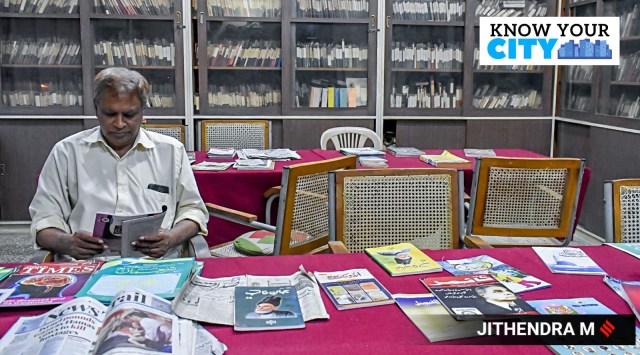Know Your City: Nestled within Shivajinagar’s crowded lanes since 1912 is an oasis of Urdu, Persian literature
For 23 years now, librarian Mohammad Altaf has been keeping watch over a rare collection of around 35,000 books at the Muslim Library in Bengaluru’s Shivajinagar.
 The first thing one is likely to see among the rows of books on the shelves is the veteran librarian Mohammad Altaf at his desk. (Express Photo by Jithendra M)
The first thing one is likely to see among the rows of books on the shelves is the veteran librarian Mohammad Altaf at his desk. (Express Photo by Jithendra M) The bylanes of Shivajinagar in Bengaluru are filled with people, noises from shops and vehicles. Every so often, one sees a building that must surely belong to the British era if not older, the stained wood and worn tiling reminiscent of a style no longer seen in most parts of the city. It is perhaps fitting that Bengaluru’s most valuable collection of Urdu and Persian literature is found in this part of the city, hiding in plain sight. At Number 8, Veerapillai Street, visitors are greeted by a trio of shops selling shoes and other goods, and a nondescript door nestled between them reveals a staircase that leads to the Muslim Library that has been operating here since 1912.
Speaking to the Indian Express, Library Trust president and senior advocate Ayub Ahmed Khan noted that the Library had also been kept financially independent from the earliest days, helping to avoid any external influence, making it one of the oldest libraries of the city, alongside the State Central Library and the Mythic Society collection.
The first thing one is likely to see among the rows of books on the shelves is the veteran librarian Mohammad Altaf at his desk. He has been working at the library for 23 years, guarding a collection of around 35,000 books in Urdu and Persian (along with a smaller number of books in other languages) that are in many cases decades old or even over a century.
Visits by Urdu literary figures
Many venerable visitors have been to the library over the years including ‘Baba-e-Urdu’ Moulvi Abdul Haq in 1937, one of the foremost Urdu literary figures of the pre-Independence era. Before him in 1931, Maulana Shaukat Ali, one of the celebrated leaders of the Khilafat movement, also made a visit. And two years before that, the space was graced by the well-known writer Dr Mohammad Iqbal who penned “Saare Jahaan se Accha”. Guest book entries from all these luminaries and more have been preserved at the library to this day and scholars continue to drop by the place.
The library’s origin in 1912 begins with a group of local intellectuals including Khan Mahmud Khan, the author of one of the most important Urdu histories of Tipu Sultan, the ‘Saltanat-e-Khudadad’. The current building dates back to 1970, but the library has not moved from its original location.
According to the librarian Altaf, “Mostly we get lecturers and students coming to the library these days, especially those who are doing PhD in Urdu. In the era of the internet, we do not have as many people coming here, but there are still a minimum of seven or eight library members who arrive every day. Among the books we have are Urdu translations of the Mahabharata, Quran, Gita and the Bible.”
 The current building dates back to 1970, but the library has not moved from its original location. (Express Photo by Jithendra M)
The current building dates back to 1970, but the library has not moved from its original location. (Express Photo by Jithendra M)
Books are issued only to members, with the older volumes carefully stacked away on the shelves. Altaf demonstrates the breadth of the collection by picking a random book off the rack – it turns out to be an Urdu poetry volume published in 1930.
The library also played a role in one of the leading TV serials of the early 1990s ‘The Sword of Tipu Sultan’. According to Altaf, actor-director Sanjay Khan arrived here to use the ‘Saltanat-e-Khudadad as a reference point for the storyline of the serial.
Over the years, Urdu enthusiasts in the city have found this to be their chief learning space. The treasurer of the library trust, Rizvi, recalls coming to the library to read general knowledge volumes in Urdu as a student in the 1970s. It has also survived as an independent institution without funding from outside – sustaining itself via subscription fees and rents from the shops operating on the ground floor of the building.
The library issues lifetime subscriptions for a sum of Rs 1,500. Those interested can visit the library from 10 am to 12 pm and from 4 pm to 8 pm on all days of the week except Fridays.







